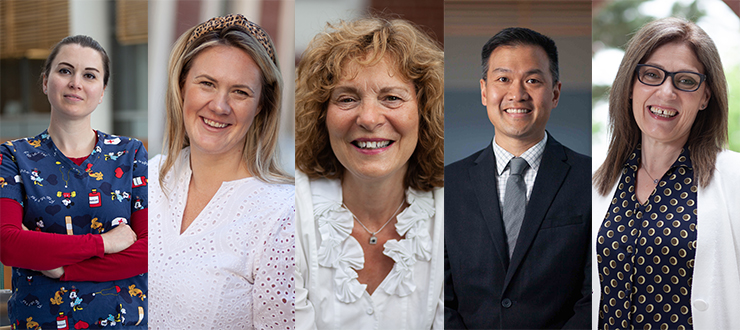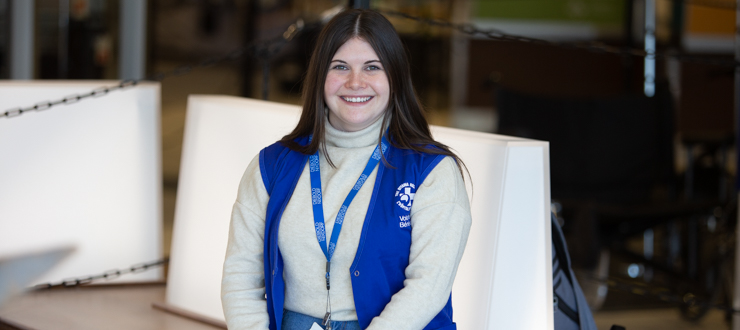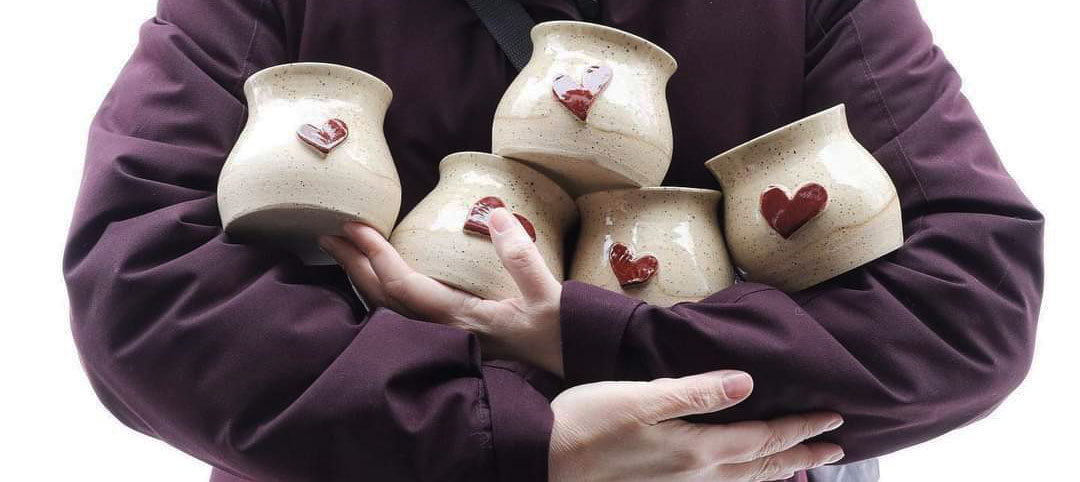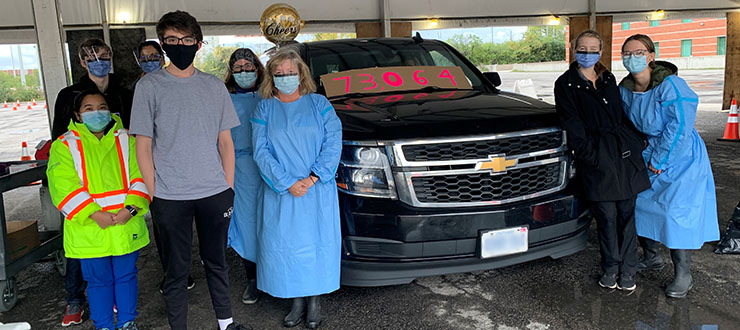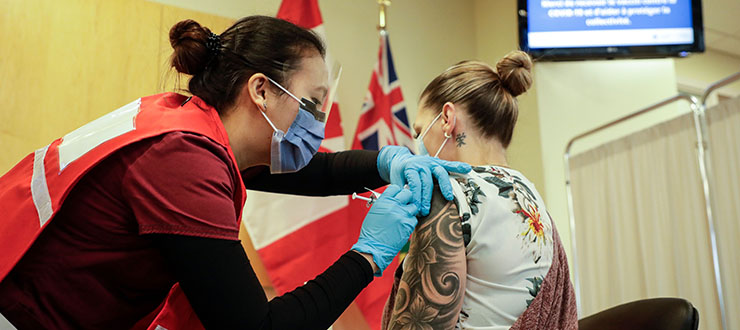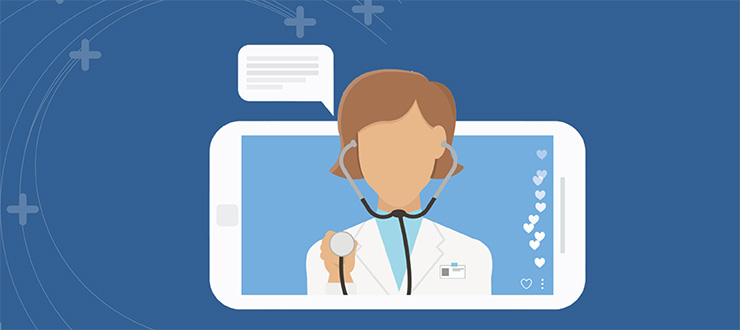
Content warning: This story talks about sexual assault and intimate partner violence.
If you have experienced sexual assault or intimate partner violence and are looking for community resources or support, jump to the bottom of this story.
Throughout the pandemic, lockdowns and warnings from public officials have encouraged people to stay home to prevent the spread of COVID-19. But for survivors of sexual assault and intimate partner violence, having access to medical care and community resources is critical to their wellbeing.

Stephany Saloojee, social worker with the SAPACP, and others offer compassionate care to survivors of sexual assault and intimate partner violence.
Thanks to virtual care, when patients need to get in touch with Stephany Saloojee, it’s now as simple as sending an email, picking up the phone, or joining a secure video chat. While virtual interactions have replaced many of the in-person elements of Stephany’s role as a social worker in The Ottawa Hospital’s Sexual Assault and Partner Abuse Care Program (SAPACP), her commitment to providing the same level of compassionate care remains the same.
The SAPACP is a team of specialized health professionals who provide private and confidential trauma- sensitive medical care to any person over 16 who has experienced sexual or intimate partner violence in the greater Ottawa region. The program is one of a kind in the area and open to patients 24/7, 365 days a year.
Patients who seek care in the program have their first visits in-person, where they can receive medical care, file an anonymous police report if they choose to do so or access other on-site services like Sexual Assault Evidence Kits or photo documentation of injuries. After the initial visit, the program’s care team follows up virtually after 48 to 72 hours, four to six weeks and three months. These virtual visits can be done over the phone or through secure video conference.
As a social worker, Stephany plays a critical role in the program by providing crisis and emotional support to patients, safety planning, crisis counselling, and consultations with police. She also helps link patients with community agencies and resources that best support their individual needs, like long-term counseling, temporary shelter, and legal aid.
Virtual care a new option for sexual assault survivors
Before the pandemic, Stephany met with patients exclusively in-person and resources, like information about local agencies, was typically given in hard-copy. Simple virtual tools like email and secure Zoom chats are taking their place, allowing Stephany to follow up and check in with patients more often than before. In fact, some of these tools have become an important part of patients’ healing journey.
“Email gives patients a chance to put their thoughts into words, which can have a tremendous positive effect. Sending me an email also empowers patients and alleviates feelings of helplessness,” explained Stephany. “It’s helping them take an active part in their recovery.”
When she first made the transition to providing virtual care, Stephany said she saw new doors opening to her patients.
“By being able to access people in their homes, work, or wherever is convenient for them, they’re able to access help where they otherwise might not,” said Stephany.
“Virtual care also helps reduce the stigma around seeking care for sexual assault or intimate partner violence. Patients don’t have to worry about running into people they know at an appointment with us or finding out they were seeing a social worker.”
Building human connection in a virtual world
Building connection and a therapeutic rapport with patients has always been an important part of Stephany’s work. And the need to stay connected has only intensified during the pandemic, especially for those who may be experiencing sexual or intimate partner violence.
Despite the physical limitations, Stephany is finding new ways to build strong human connections and provide compassionate care virtually.
“I had to become more creative in working with patients and I had to stay up to date on the latest supports available,” said Stephany. “People might think virtual care could impact human connection, but this isn’t the case. Patients can still be their authentic selves and still experience connection, empathy, support and personal growth.”
To make sure patients still feel safe and comfortable in their online interactions together, Stephany takes an open, honest approach.
“I build on small talk, find a connection with patients, talk about their goals, and review privacy and confidentiality because these are really important to people,” said Stephany. “I encourage my patients to ask me questions, remind them that this is a conversation and that they’re helping me understand their situation so I can help in whatever way I can.”
Study shows drop in number of survivors of sexual assault and intimate partner violence seeking care during lockdown
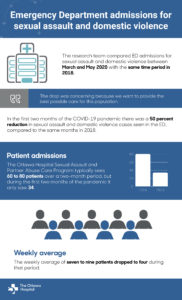
Right now, Stephany is busier than she’s ever been. But this hasn’t always been the case.
The program saw a 50 percent drop in patients presenting to The Ottawa Hospital Emergency Department (ED) for sexual assault and domestic violence during the spring lockdown of 2020, according to a study published in BMC Medicine.
The research team compared ED admissions for sexual assault and domestic violence between March and May 2020 with the same time period in 2018. The SAPACP typically sees 60 to 80 patients over a two-month period, but during the first two months of the pandemic, it only saw 34. The weekly average of seven to nine patients dropped to four during that time.
“This drop was concerning because we want to provide the best possible care for this population,” said Dr. Kari Sampsel, Medical Director of the SAPACP. “We know from other data sources, particularly our community agencies, that sexual assault and domestic violence was still happening.”
Dr. Sampsel and her team think there could be multiple factors behind the decrease in ED admissions. A likely explanation is that many people avoided hospitals entirely in the early days of the pandemic out of fear of contracting COVID-19. Other possible factors include being isolated at home with a controlling or violent partner and unable to leave to seek care or having fewer social interactions with people outside the home.
The research team also conducted a study with individuals who gave birth at The Ottawa Hospital in the first three months of the COVID-19 pandemic and found that 24 percent reported intimate partner violence during pregnancy and post-partum. “This provides more evidence on how violent and abusive behaviours are happening in all populations during this high-risk period and access to services is critical,” said Dr. Katherine Muldoon, Senior Research Associate at The Ottawa Hospital and Assistant Professor with the Department of Obstetrics and Gynecology at the University of Ottawa.
While visits to the program have increased in recent months, Dr. Sampsel is still encouraging those who may need help to reach out. “Our program is going to take good care of you, whether it’s in-person or virtually.”
Emergency Department admissions for sexual assault and domestic violence
The research team compared ED admissions for sexual assault and domestic violence between March and May 2020 with the same time period in 2018.
“The drop was concerning because we want to provide the best possible care for this population.”
In the first two months of the COVID-19 pandemic there was a 50 percent reduction in sexual assault and domestic violence cases seen in the ED, compared to the same months in 2018.
Patient admissions
The Ottawa Hospital Sexual Assault and Partner Abuse Care Program typically sees 60 to 80 patients over a two-month period, but during the first two months of the pandemic it only saw 34.
Weekly average
The weekly average of seven to nine patients dropped to four during that period.
Compassionate care for survivors is available 24/7, 365 days a year

Dr. Kari Sampsel, Medical Director of the SAPACP, and a team of researchers examined ED admissions for sexual assault and domestic violence between March and May 2020 with the same time period in 2018.
In addition to the SAPACP, community agencies across the region, like Ottawa Victim Services and the Sexual Assault Support Centre of Ottawa, continue to provide around-the-clock support to survivors of sexual assault and intimate partner violence.
New virtual services, like Unsafe at Home Ottawa and Counselling Connect, were launched during the pandemic to increase access and awareness of the supports available.
But, if a trip to the hospital is a safe option, or a phone conversation would be more comfortable, the SAPACP’s team of highly trained, compassionate staff are ready to provide the best care possible – 24/7, 365 days a year.
“Regardless of how difficult life is right now and the limitations and pressures that have come from this pandemic, our program is there,” said Stephany. “We can help you.”
Resources for those affected by sexual assault or intimate partner violence:
- Ottawa support services open during the pandemic
- Unsafe at Home Ottawa, a secure text and online chat service
- Counselling Connect, free online counselling
- The Ottawa Hospital Sexual Assault and Partner Abuse Care Program is available 24/7 at The Ottawa Hospital Civic Campus Emergency Department to work with survivors of sexual assault or intimate partner violence and help them receive the specialized care they need
Learn more about virtual care at The Ottawa Hospital.
Read our simple tips for your next online appointment.

Support patient care and research at
The Ottawa Hospital
You might also like…
Taking the power back: The Ottawa Hospital reflects on a year of pandemic milestones
Looking back on the past year, it is incredible what our staff have achieved in such a short span of time, from opening our community clinics to researching new vaccines. Learn about the hard work that has gone into safeguarding our community, as told by our staff both on the front lines and behind the scenes.
Make self-kindness a lifestyle: Five practical tips to get you started
A good self-kindness routine can help you reduce stress and hone your compassion for others. If you’re looking for inspiration, discover how our care staff have made self-kindness a lifestyle.
Med school hopeful Anne-Marie helps patients navigate hospital COVID protocols
If you’ve visited any hospital in the past two years, you may understand the stresses of keeping up with COVID-19 protocols. Throughout the pandemic, Anne-Marie Hartford has provided clarity to patients and their families.
The power of a hug… and a mug
When the pandemic put an end to hugs, Stacey Smith, a behavioral therapist at The Ottawa Hospital knew she needed to come up with a physically-distanced alternative for her team. A local potter (yes, a potter) had the answer.
Drive-thru testing centre an Ottawa COVID-19 success story
Braving cold temperatures, floods and snowstorms, the dedicated team at the Coventry Road drive-thru testing centre performed more than 73,000 COVID-19 tests during 13 months of service, making this location one of the most efficient testing centres in Ontario.
First anniversary of the COVID-19 vaccine: Memories of a historic day
On December 15, 2020, The Ottawa Hospital administered the very first COVID-19 vaccinations in Ottawa. One year later, hospital staff on the front lines and behind the scenes share their memories of that historic day.


 To reset, hold the Ctrl key, then press 0.
To reset, hold the Ctrl key, then press 0.
